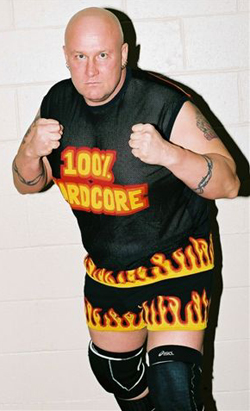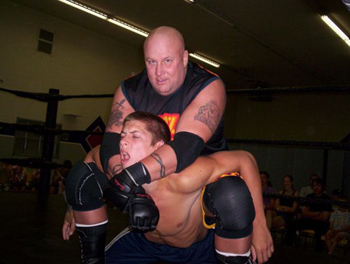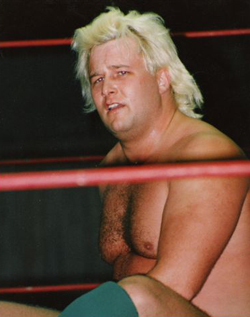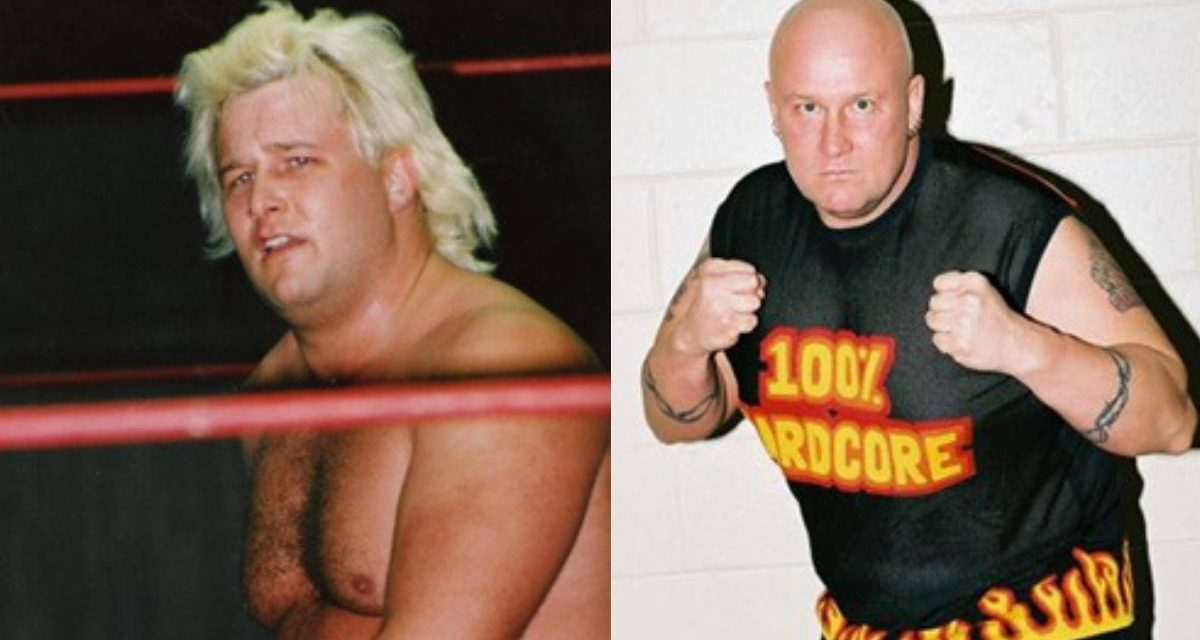If there is one thing that separates Tim Flowers from all the other wrestlers that toil away night after night on the independent circuit it is that now that he has retired, he has no plans to ever step foot in a wrestling ring again.
At first, that statement doesn’t sound all that unique — after all, every retiring wrestler says that until they show up for their big “return” match. But then you listen to Flowers talk about his retirement and it starts to sound a little different. “I’m never coming back,” he said in an interview with SLAM! Wrestling. “The belts are hanging on the wall in the gym and my boots are getting bronzed over Christmas.”
It’s the end of a wrestling career that started just over 28 years ago and in the interim, the business has simply changed too much for the man once known as Diamond Timothy Flowers. “It’s changed for the worst,” Flowers, who for the last several years has run his own promotion in the Pacific Northwest, International Championship Wrestling. “I love it but I hate it,” he said of the modern wrestling era. “I love the old business but I hate what it’s become. All these guys come in here and think they can do a couple of flips and they are workers. They think they are stars and demand all this money when they should actually be paying me.”

Tim Flowers
It’s not as if he didn’t attempt to roll with the punches, either. “I put myself through hell and back,” Flowers said, reflecting on the past when he tried to build a bridge between the classic era of wrestling and the latest fad. “I did all that hardcore crap and was doing it all before anyone thought of it before. People used to knock me for doing it, and then base their entire promotion around it.”
As an example, it was Flowers who first conceived the concept of having all matches on a show contested within the confines of a steel cage. That was back in 1989 and the show was held at Douglas College in New Westminster, B.C. “Then,” Flowers recalled, “everybody else started doing the same thing.”
Flowers can remember talking to the one and only Bruiser Brody about how tables and chairs seemed to be future of the business. “This is what it is going to be about one day,” he was told and those words were prophetic. But for Flowers, that was not progression; it was more like de-evolution. That’s why he started his own promotion, ICW.
“I tried to keep it all the old way with just a bit of the new taste,” he explained. It was an idea that proved difficult to manage. “It’s so damn hard to keep everyone happy. The boys, the fans — it’s virtually impossible. Everyone thinks to run a show all you need to do is set a ring up and people show up. And it’s so much more than that.”
Flowers’ decision to hang up his boots was not solely based on the current direction of pro wrestling, though if it had been, who could have blamed him? Flowers is not a young man any more. Born in 1960, and raised in Rochester, NY, the young Timothy Reed was a wrestling fan growing up. His father, Roger Reed, was promoter of Universal Sports Limited, a small wrestling promotion out of Rochester, and Tim trained under Dr. Jerry Graham to become a pro wrestler, and debuted in Toledo, Ohio against Wild Bill Curry in June 1978. Now at 46 years of age, Flowers feels each match more exquisitely than men half his age. A hernia in his large intestine added to his challenges, affecting his work in the ring in a profound way.
“It was very painful,” he recalled. “I couldn’t even slam anyone for the last six months. I realized I couldn’t do those things anymore. Even a trip from Vancouver to Seattle made me squirm — I just wanted to get out of the car. I don’t know if that’s because my body is so banged up but you know I still consider myself lucky because a lot of guys that were into the shit I was, wouldn’t have made it to see 40 because of all the things I did before. But, hey, I got all my own teeth and am going on with my life.”
That life includes a 16-year old daughter, a three-year-old daughter and a one-year old boy. “So you see I have lots to do; lots of things I want to do that I never could do before because I had wrestling matches.”
His last match was September 30, 2006. It was held in the Alice MacKay Building at the Cloverdale Fairgrounds in B.C. But, on that night, he did not lock up with a legend of the business, as many retiring wrestlers long to do. Instead, in typical Tim Flowers style, he did the atypical thing: he wrestled against one of his co-workers at Costco, his so-called “real” job.
In fact his final opponent was the manager of the Langley Costco, a man who had expressed some interest in getting into wrestling. Flowers invited him to come and referee a couple of ICW matches and he subsequently became a manager. Flowers had a deep respect for this man and thought it’d be neat to wrestle his final match against him in Cloverdale, a place that holds special meaning for the man now known in this modern era as “Streetfighter” Tim Flowers.

“Streetfighter” Tim Flowers punishes an opponent recently
“I have nothing but great memories in Cloverdale,” Flowers said. The night of his last match, the crowd was comprised 99% of Costco employees out to see two of their co-workers wrestle. They likely could not appreciate the history they were witnessing, as a man who had called the wrestling ring home performed for the last time.
“I thought that night would be a very emotional time,” Flowers reflected. “But the only time I got emotional was when I was walking to the ring that final time. I had a bit of a tear in my eye and my daughter saw it. And, you know, that’s the only part I am going to miss — being in the ring and seeing some of those fans that supported for years, from those crazy Al Tomko days in All-Star wrestling.”
Despite the memories and the sadness of never being able to perform in front of loyal fans, Flowers maintained his choice was not one he brooded over. “It wasn’t a hard decision, it really wasn’t. I wish it could be like it was, but I don’t think it ever will be.”
That night in Cloverdale, he signed autographs for the fans — but, as usual, not by the moniker he has come to be known as — “Streetfighter” Tim Flowers — but as the name he, and those that followed his career, will always remember him by: Diamond Timothy Flowers.
“No matter what my name was, and I could have changed it to Joe Blow, people knew me as Diamond Tim Flowers. And, you know, people can say a lot of bad things about me but they could never say I didn’t take time to stop and talk to the fans.”

“Diamond” Timothy Flowers, then…
People remember Flowers most for that ridiculous piledriver he gave Tim Patterson from the ring apron the concrete floor back in All-Star Wrestling. “Everybody remembers that, everybody,” he said. “They remember that most of all — that’s been brought up to me more times than anything.” But Flowers would rather be remembered not as the guy that executed a devastating move, but for the sum total of what he did and the reasons he did it.
“I just wanted to entertain the fans,” he explained. “It turned me on to turn them on and I liked bringing them up and liked bringing them down. All I ever tried to do was perform for them. All I ever tried to do was have some fun doing something I loved. I never cared about the money; I always had something else going on to pay the bills. I did it all because I loved it.”
And just because Tim isn’t going to be wrestling anymore doesn’t mean he’s going to cruise around the world playing shuffleboard. He is looking into getting into mixed martial arts and has begun some boxing training. And he is teaching some of the local guys who are into martial arts some amateur wrestling skills. There will not, it appears, be any cribbage tournaments for Diamond Timothy Flowers.
“I just want to thank all the fans and the people who supported me and sponsored me through the years,” he replied when asked what he wanted to say as a final parting note. “I’ve been everywhere and done everything. There’s not much I can say I haven’t done or places I haven’t been. Sure, I stepped on a few toes along the way but, tough shit, that’s the way it goes. When I die, I don’t think I’ll go to heaven or hell but somewhere in between. It took me awhile to grow up and figure out what’s what, but I enjoy my life now. I just want to live a normal life now.” He paused. “I guess most people wouldn’t consider my life normal, but it’s as normal as it’s going to get I guess.”
The independent wrestling world will move on without Diamond Timothy Flowers, but it won’t be the same. His legacy — forged over 28 years and through all the ups and downs of a controversial life — is not likely to be forgotten. It is assured that he will most certainly not forget what wrestling gave him and the lessons that will follow him into his retirement.
“I’m a wrestler,” he said simply, “I have been ever since I was 14 years old. And whether it’s as an amateur or pro, I am always going to be a wrestler. No one’s ever going to be able to take that away from me.”
RELATED LINKS
- Diamond Timothy Flowers Career Record
- Feb. 2, 2022: Terry Justice, briefly, king of newsletters
- Apr. 30, 1998: Diamond Timothy Flowers transitions to Streetfighter
EDITOR’S NOTE: The spelling of Timothy Flowers’ last name has been corrected to Reed; it was erroneously listed as Reid.

